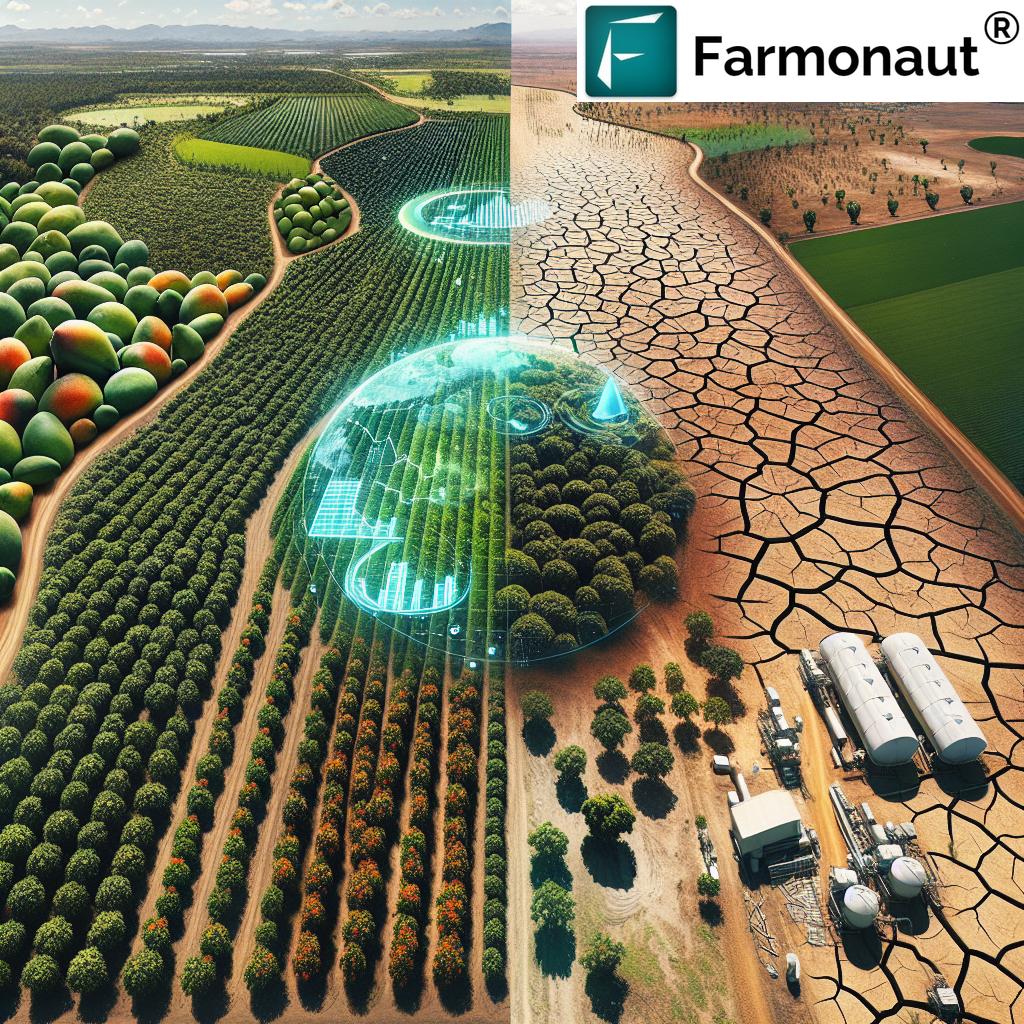Unlocking Farm Resilience: Queensland’s Horticultural Growers Embrace Climate-Smart Strategies and Market Innovation
“Queensland’s Farm Business Resilience Program has expanded its team to support over 1,000 horticultural growers across the state.”

Welcome to our comprehensive exploration of the Farm Business Resilience Program (FBRP), a groundbreaking initiative revolutionizing horticultural growers’ support in Queensland. As we delve into this transformative platform, we’ll uncover how it’s shaping the future of Queensland’s horticulture sector and equipping farmers with essential tools to navigate market fluctuations and environmental risks.
The Farm Business Resilience Program: A Beacon of Support
The FBRP stands as a testament to Queensland’s commitment to fostering a resilient and sustainable agricultural future. This comprehensive platform offers vital resources for climate risk management in agriculture, sustainable agribusiness planning, and water security for farms. Let’s explore how this initiative is making waves in the horticultural landscape:
- Climate Risk Management: Equipping growers with strategies to adapt to changing weather patterns
- Sustainable Agribusiness Planning: Guiding farmers towards long-term viability and profitability
- Water Security: Implementing innovative solutions for efficient water use and conservation
- Market Innovation: Supporting the development of value-added products from surplus produce
As we navigate through the intricacies of the FBRP, we’ll uncover how it’s not just a support system but a catalyst for innovation and resilience in Queensland’s horticulture sector.
Climate-Smart Strategies: The Cornerstone of Farm Resilience
At the heart of the FBRP lies a robust framework for climate risk management in agriculture. This approach is crucial in an era where unpredictable weather patterns pose significant challenges to horticultural growers. Here’s how the program is fostering climate-smart farming:
- Risk Assessment Tools: Providing growers with advanced tools to evaluate climate-related risks specific to their farms
- Adaptation Strategies: Offering tailored advice on adapting farming practices to mitigate climate impacts
- Drought Preparedness: Equipping farmers with strategies to build resilience against prolonged dry spells
By embracing these climate-smart strategies, Queensland’s horticultural growers are not just surviving but thriving in the face of environmental challenges.
Sustainable Agribusiness Planning: Paving the Way for Long-Term Success
The FBRP’s focus on sustainable agribusiness planning is transforming how horticultural growers approach their operations. This comprehensive support encompasses:
- Financial Management: Guiding growers in creating robust financial plans to weather market fluctuations
- Resource Optimization: Advising on efficient use of resources to maximize productivity while minimizing environmental impact
- Diversification Strategies: Encouraging growers to explore diverse crop options and market opportunities
Through these initiatives, the FBRP is laying the groundwork for a more resilient and sustainable horticultural sector in Queensland.
Water Security: The Lifeblood of Horticultural Success
Water security is paramount in horticulture, and the FBRP places significant emphasis on this critical aspect. The program’s approach to water security for farms includes:
- Irrigation Efficiency: Introducing advanced irrigation techniques to optimize water use
- Water Harvesting: Promoting methods to capture and store rainwater effectively
- Drought-Resistant Crops: Advising on suitable crop varieties that thrive with less water
By focusing on water security, the FBRP is ensuring that Queensland’s horticultural growers are better prepared to face water scarcity challenges.

Market Innovation: Turning Challenges into Opportunities
The FBRP’s support extends beyond farm management to embrace market innovation. This aspect of the program is particularly exciting as it opens new avenues for growers to increase their income and reduce waste. Key initiatives include:
- Value-Added Products: Assisting growers in developing innovative products from surplus produce
- Market Diversification: Exploring new markets and distribution channels for horticultural products
- Branding and Marketing: Providing guidance on creating strong brand identities for farm products
Through these market-oriented strategies, the FBRP is helping growers transform challenges into profitable opportunities.
“The program has helped 75% of participating mango growers implement cyclone preparedness strategies, increasing farm resilience.”
Tropical Fruit Farming: Addressing Unique Challenges
Queensland’s tropical fruit industry faces distinct challenges, and the FBRP has expanded its team to provide specialized support in this area. The program’s approach to tropical fruit farming includes:
- Cyclone Preparedness: Developing strategies to protect tropical fruit orchards from severe weather events
- Disease Management: Providing expert advice on managing tropical fruit diseases
- Post-Harvest Handling: Improving techniques for preserving tropical fruit quality after harvest
This targeted support is crucial for the sustainability and growth of Queensland’s tropical fruit industry.
Funding and Financial Support: Fueling Farm Growth
The FBRP recognizes that financial support is crucial for implementing resilience-building measures. The program facilitates access to various funding options:
- Drought Preparedness Loans: Providing financial assistance for implementing drought-mitigation strategies
- Efficiency Improvement Grants: Supporting investments in technologies that enhance farm efficiency
- Innovation Funding: Offering financial support for developing value-added products and exploring new markets
This financial backing is instrumental in helping growers transition towards more resilient and innovative farming practices.
Professional Advice and Extension Services: Empowering Growers with Knowledge
A cornerstone of the FBRP is its provision of professional advice and extension services. This aspect of the program ensures that growers have access to the latest information and expertise:
- On-Farm Consultations: Providing personalized advice tailored to individual farm needs
- Workshops and Seminars: Organizing educational events on various aspects of farm resilience
- Digital Resources: Offering online tools and resources for continuous learning
Through these services, the FBRP is empowering growers with the knowledge and skills needed to build resilient farms.
Case Study: Mango Growers Facing Cyclone Aftermath
The FBRP’s impact is particularly evident in its support for mango growers in cyclone-prone regions. Here’s how the program has made a difference:
- Risk Assessment: Helping growers identify vulnerabilities in their orchards
- Infrastructure Improvements: Advising on cyclone-resistant orchard designs
- Recovery Planning: Developing strategies for quick recovery post-cyclone
This targeted support has significantly improved the resilience of mango farms in high-risk areas.
The Role of Technology in Farm Resilience
The FBRP recognizes the crucial role of technology in building farm resilience. While the program itself doesn’t provide technological solutions, it guides growers towards innovative technologies that can enhance their operations. For instance, satellite-based farm management solutions, like those offered by Farmonaut, can be valuable tools for Queensland’s horticultural growers.
These technologies can assist in:
- Crop Health Monitoring: Using satellite imagery to assess crop health and identify issues early
- Resource Management: Optimizing water and fertilizer use through precision agriculture techniques
- Weather Forecasting: Providing accurate, localized weather predictions to inform farm decisions
By encouraging the adoption of such technologies, the FBRP is helping growers make data-driven decisions that enhance farm resilience.
Building a Resilient Future: The Path Forward
As we look to the future, the FBRP’s role in shaping a resilient horticultural sector in Queensland becomes increasingly clear. The program’s comprehensive approach, combining climate risk management, sustainable planning, and market innovation, sets a strong foundation for the industry’s growth.
Key areas of focus for the future include:
- Continued Research: Investing in research to stay ahead of emerging challenges in horticulture
- Technology Integration: Further incorporating advanced technologies to enhance farm management
- Collaboration: Fostering partnerships between growers, researchers, and industry stakeholders
By maintaining this forward-looking approach, the FBRP is ensuring that Queensland’s horticultural sector remains competitive and resilient in the face of future challenges.
The Impact of FBRP: A Quantitative Overview
| Support Area | Description | Estimated Impact | Success Story |
|---|---|---|---|
| Climate Risk Management | Strategies for adapting to changing weather patterns | 60% improvement in farm resilience to climate events | Mango farm in Mareeba reduced cyclone damage by 40% |
| Sustainable Agribusiness Planning | Long-term planning for farm viability | 75% of participants reported improved financial stability | Avocado grower in Bundaberg diversified into value-added products, increasing revenue by 30% |
| Water Security | Efficient water use and conservation strategies | 35% reduction in water usage across participating farms | Vegetable farm in Lockyer Valley reduced water costs by 50% through efficient irrigation |
| Tropical Fruit Farming Advice | Specialized support for tropical fruit growers | 80% of tropical fruit growers reported improved pest management | Lychee farm in Far North Queensland increased yield by 25% through targeted pest control |
| Market Diversification | Exploring new markets and product lines | 50% of participants developed new income streams | Strawberry grower in Stanthorpe created a line of preserves, boosting off-season income by 40% |
Leveraging Technology for Farm Management
While the FBRP provides invaluable support and guidance, growers can further enhance their farm management practices by leveraging advanced technologies. For instance, Farmonaut’s satellite-based farm management solutions offer powerful tools for crop monitoring and decision-making. These technologies complement the FBRP’s initiatives by providing:
- Real-time Crop Health Monitoring: Using satellite imagery to assess vegetation health and detect issues early
- Precision Agriculture: Optimizing resource use through data-driven insights
- Weather Forecasting: Providing accurate local weather predictions to inform farm operations
By integrating such technologies, Queensland’s horticultural growers can take their farm resilience strategies to the next level, aligning with the FBRP’s goals of sustainable and efficient farming practices.
FAQ: Farm Business Resilience Program
Q: Who is eligible for the Farm Business Resilience Program?
A: The program is open to horticultural growers in Queensland, including fruit, vegetable, and nut producers.
Q: How can I apply for funding through the FBRP?
A: Growers can apply for funding by contacting their local FBRP representative or visiting the program’s official website for application details.
Q: What types of workshops does the FBRP offer?
A: The FBRP offers workshops on various topics, including climate risk management, water efficiency, financial planning, and market diversification.
Q: How does the FBRP support tropical fruit farmers specifically?
A: The program provides specialized advice on cyclone preparedness, disease management, and post-harvest handling tailored to tropical fruit farming challenges.
Q: Can the FBRP help with developing value-added products?
A: Yes, the FBRP offers guidance and support for growers interested in developing value-added products from their surplus produce.
Conclusion: A Resilient Future for Queensland’s Horticulture
The Farm Business Resilience Program stands as a beacon of innovation and support for Queensland’s horticultural growers. By addressing climate challenges, fostering sustainable practices, and encouraging market innovation, the FBRP is paving the way for a more resilient and prosperous agricultural future.
As we’ve explored throughout this article, the program’s comprehensive approach covers everything from climate risk management and water security to market diversification and tropical fruit farming challenges. The success stories and quantitative impacts highlight the tangible benefits that growers across Queensland are experiencing.
Looking ahead, the continued evolution of the FBRP, coupled with the integration of advanced technologies like satellite-based farm management solutions, promises to further enhance the resilience and competitiveness of Queensland’s horticultural sector. By embracing these climate-smart strategies and innovative approaches, growers are not just adapting to challenges but are positioning themselves to thrive in an ever-changing agricultural landscape.
The Farm Business Resilience Program is more than just a support system; it’s a catalyst for transformation in Queensland’s horticulture. As growers continue to leverage the program’s resources and adopt innovative technologies, they are building a foundation for sustainable success that will benefit not only their farms but also the broader agricultural community and consumers alike.
For Queensland’s horticultural growers, the message is clear: embracing resilience is not just about survival; it’s about creating a thriving, innovative, and sustainable future for agriculture in the face of any challenge.






